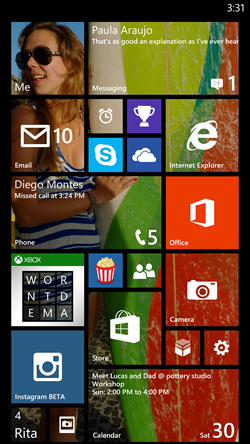Related Research Articles
Mobile app development is the act or process by which a mobile app is developed for one or more mobile devices, which can include personal digital assistants (PDA), enterprise digital assistants (EDA), or mobile phones. Such software applications are specifically designed to run on mobile devices, taking numerous hardware constraints into consideration. Common constraints include CPU architecture and speeds, available memory (RAM), limited data storage capacities, and considerable variation in displays and input methods. These applications can be pre-installed on phones during manufacturing or delivered as web applications, using server-side or client-side processing to provide an "application-like" experience within a web browser.
Android is a mobile operating system based on a modified version of the Linux kernel and other open-source software, designed primarily for touchscreen mobile devices such as smartphones and tablets. Android is developed by a consortium of developers known as the Open Handset Alliance, though its most widely used version is primarily developed by Google. It was unveiled in November 2007, with the first commercial Android device, the HTC Dream, being launched in September 2008.

Windows Phone (WP) is a discontinued mobile operating system developed by Microsoft for smartphones as the replacement successor to Windows Mobile and Zune. Windows Phone featured a new user interface derived from the Metro design language. Unlike Windows Mobile, it was primarily aimed at the consumer market rather than the enterprise market.

Rebtel is a Swedish technology company founded in 2006 by Hjalmar Winbladh and Jonas Lindroth which sells products and services to migrants and international travelers. Its services include international calling, messaging and mobile payment delivered in applications for Android, iPhone, and Windows Phone.

Here Technologies is a Dutch multinational group specialized in mapping technologies, location data and related automotive services to individuals and companies. It is majority-owned by a consortium of German automotive companies and American semiconductor company Intel whilst other companies also own minority stakes. Its roots date back to U.S.-based Navteq in 1985, which was acquired by Finland-based Nokia in 2007. Here is currently based in The Netherlands.
Apache Cordova is a mobile application development framework created by Nitobi. Adobe Systems purchased Nitobi in 2011, rebranded it as PhoneGap, and later released an open-source version of the software called Apache Cordova. Apache Cordova enables software programmers to build hybrid web applications for mobile devices using CSS3, HTML5, and JavaScript, instead of relying on platform-specific APIs like those in Android, iOS, or Windows Phone. It enables the wrapping up of CSS, HTML, and JavaScript code depending on the platform of the device. It extends the features of HTML and JavaScript to work with the device. The resulting applications are hybrid, meaning that they are neither truly native mobile application nor purely Web-based. They are not native because all layout rendering is done via Web views instead of the platform's native UI framework. They are not Web apps because they are packaged as apps for distribution and have access to native device APIs. Mixing native and hybrid code snippets has been possible since version 1.9.
Waze Mobile Ltd, doing business as Waze, formerly FreeMap Israel, is a subsidiary company of Google that provides satellite navigation software on smartphones and other computers that support the Global Positioning System (GPS). In addition to turn-by-turn navigation, it incorporates user-submitted travel times and route details while downloading location-dependent information over a cellular network. Waze describes its application as a community-driven initiative that is free to download and use.

RhoMobile Suite, based on the Rhodes open source framework, is a set of development tools for creating data-centric, cross-platform, native mobile consumer and enterprise applications. It allows developers to build native mobile apps using web technologies, such as CSS3, HTML5, JavaScript and Ruby. Developers can deploy RhoMobile Suite to write an app once and run it on the most-used operating systems, including iOS, Android, Windows Phone, Windows Mobile, Windows CE, Windows 10 Mobile and Windows Desktop. Developers control how apps behave on different devices. RhoMobile Suite consists of a set of tools for building, testing, debugging, integrating, deploying and managing consumer and enterprise apps. It consists of the products Rhodes, RhoElements, RhoStudio, RhoConnect, and RhoGallery, and includes a built-in Model View Controller pattern, an Object Relational Mapper for data intensive apps, integrated data synchronization, and a broad API set. These mobile development services are offered in the cloud and include hosted build, synchronization and application management.

Android software development is the process by which applications are created for devices running the Android operating system. Google states that "Android apps can be written using Kotlin, Java, and C++ languages" using the Android software development kit (SDK), while using other languages is also possible. All non-Java virtual machine (JVM) languages, such as Go, JavaScript, C, C++ or assembly, need the help of JVM language code, that may be supplied by tools, likely with restricted API support. Some programming languages and tools allow cross-platform app support. Third party tools, development environments, and language support have also continued to evolve and expand since the initial SDK was released in 2008. The official Android app distribution mechanism to end users is Google Play; it also allows staged gradual app release, as well as distribution of pre-release app versions to testers.

Xamarin is a Microsoft-owned San Francisco-based software company founded in May 2011 by the engineers that created Mono, Xamarin.Android and Xamarin.iOS, which are cross-platform implementations of the Common Language Infrastructure (CLI) and Common Language Specifications.
A mobile application or app is a computer program or software application designed to run on a mobile device such as a phone, tablet, or watch. Mobile applications often stand in contrast to desktop applications which are designed to run on desktop computers, and web applications which run in mobile web browsers rather than directly on the mobile device.
Metaio GmbH was a privately held augmented reality (AR) company that was acquired by Apple Inc. in May of 2015. Headquartered in Munich, Germany, with subsidiaries in San Francisco, California, New York City, New York, and Dallas, Texas, Metaio provided a software development kit (SDK) for programming PC, web, mobile applications, and custom offline augmented reality applications. Additionally, Metaio was the creator of Junaio, a free mobile AR browser available for Android and iOS devices.
Microsoft mobile services are a set of proprietary mobile services created specifically for mobile devices; they are typically offered through mobile applications and mobile browser for Windows Phone platforms, BREW, and Java. Microsoft's mobile services are typically connected with a Microsoft account and often come preinstalled on Microsoft's own mobile operating systems while they are offered via various means for other platforms. Microsoft started to develop for mobile computing platforms with the launch of Windows CE in 1996 and later added Microsoft's Pocket Office suite to their Handheld PC line of PDAs in April 2000. From December 2014 to June 2015, Microsoft made a number of corporate acquisitions, buying several of the top applications listed in Google Play and the App Store including Acompli, Sunrise Calendar, Datazen, Wunderlist, Echo Notification Lockscreen, and MileIQ.
Opera Mobile Store was a platform-independent browser-based app store for mobile-phone owners and a digital application distribution platform used by more than 40,000 developers. It is owned and maintained by Opera. Launched by a third-party provider in March 2011, the Opera Mobile Store was relaunched on a new platform, after acquisition of Handster, a mobile app store platform company, in January 2012. The service allows users to browse and download applications for over 7,500 different devices on Android, Java, BlackBerry OS, Symbian, iOS, and Windows Mobile.

Appcelerator is a privately held mobile technology company based in San Jose, California. Its main products are Titanium, an open-source software development kit for cross-platform mobile development, and the Appcelerator Platform.
Azumio is a mobile health company that specializes in biometric mobile technology. Founded in 2011, Azumio develops Apple iOS and Android health apps and services. Azumio has released 24 apps on iOS, 5 apps on Android, and 3 apps on Windows Phone. The company is headquartered in Palo Alto, California.

Good Technology, owned by BlackBerry Limited, is a mobile security provider headquartered in Sunnyvale, California, United States. The company serves more than 5,000 organizations worldwide in industries such as financial services, healthcare, manufacturing, energy and utilities, legal, government, and technology. Good makes products for managing and securing mobile devices in a business environment. The company focuses on securing apps and data on mobile devices.
TestFlight is an online service for over-the-air installation and testing of mobile applications, currently owned by Apple Inc. and only offered to developers within the iOS Developer Program. Developers sign up with the service to distribute applications to internal or external beta testers, who can subsequently send feedback about the application to developers. The TestFlight SDK additionally allows developers to receive remote logs, crash reports and tester feedback.
Crashlytics was a Boston, Massachusetts-based software company founded in May 2011 by entrepreneurs Wayne Chang and Jeff Seibert. Crashlytics helps collecting, analyzing and organizing app crash reports.
References
- ↑ Albright, S. (2012, March 13). Bugsense: Must Have Tool For Android Developers. at PB Android. Retrieved January 2, 2014.
- ↑ Sæther, P. O. (n.d.). Live crash reports for your apps using BugSense at Breathing Tech. Retrieved January 2, 2014.
- ↑ E. N., (2012, April 10). Fighting bugs of all kinds. An interview with bugsense and its journey to success. Archived January 6, 2014, at the Wayback Machine Retrieved January 2, 2014.
- ↑ Angel.co Retrieved January 2, 2014.
- ↑ (2014, January 5). Appbrain.com Retrieved January 5, 2014
- ↑ (2013, September 16). Press Release The Wall Street Journal at The Wall Street Journal Retrieved January 2, 2014[ dead link ]